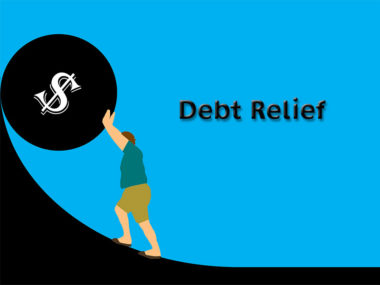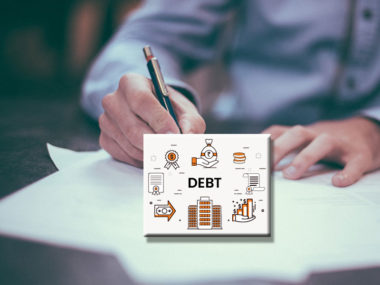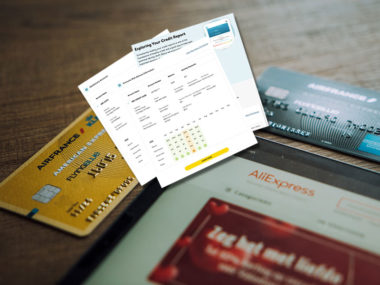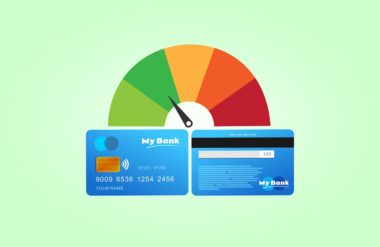If you’ve started researching how to get out of debt, you may have felt overwhelmed by all the suggestions and techniques provided by experts and financial institutions. It’s important to understand that there’s no quick fix to get out of debt fast. The road to becoming debt-free takes time, dedication, and a basic understanding of your finances.
The good news is, if you can develop and adhere to a realistic financial plan that allows you to live within your means and emphasizes paying off your debts, you’ll be well on your way to reaching your financial goals.
Table of Contents
Outline Your Expenses
If your goal is to get out of debt, it’s important to understand how to calculate and manipulate your debt-to-income ratio. This ratio is simply the amount of debts (note that this ratio includes debts only, not recurring monthly expenses) you have each month divided by the amount of gross monthly income you earn. For example, if your rent is $1,500 each month and you also pay $500 for your car loan, your total debts are $2,000. If your monthly income total is $3,000, you can divide it by your total monthly debts ($2,000). Convert this sum into a percentage to find out your ratio, which in this case, is around 66 percent.
When calculating your monthly expenses, not only is it necessary to know your debt-to-income ratio, it’s also important to be realistic and include:
- Groceries.
- Utility and cable expenses.
- Elective spending, including eating out or entertainment.
- Other recurring bills, including a cell phone bill.
A healthy debt-to-income ratio is generally between 36 and 43 percent. If your ratio is higher than this, you may be accumulating dangerous debt that can lead to more severe financial consequences. In many cases, you may not qualify for a home mortgage with a lender if your ratio is higher than 43 percent. The lower you can get your ratio, the more financial freedom you’ll have to pay off credit card bills and other loans in order to eventually become debt-free.
Your ratio and your monthly expenses give you an all-encompassing view of your household’s monthly budget, and how much you can allot to paying off debt. By understanding your these numbers, you can calculate the exact amount you should have left over. This extra money should go directly to lowering your debt.
If you’re focused on how to get out of debt fast, it’s important to always have an accurate debt-to-income ratio calculated. You may need to revise your budget and re-calculate your ratio if your household experiences any financial changes, such as:
- Debt consolidation.
- Lower interest rates.
- A new loan.
- Additional income.
Build Your Budget and Stick to It
Understanding your debt-to-income ratio is important if you want to get out of debt fast, but creating a personal budget and sticking to it is also key. To manage your debt, you’ll need to make moves so you can shift the balance between what you’re spending and how much money you’re making.
While you may feel like you’re stuck within the confines of your current budget, you can make the decision to change your spending behaviors and lower your monthly expenses. If you often ask “Where does all my money go?”, attempt to identify the elective expenses that you can easily live without or don’t use anymore. Recognize your spending habits and make changes that allow you to lower your debt-to-income ratio. This can be accomplished by eliminating certain expenses and/or increasing your monthly income.
By simply focusing on living a frugal (not cheap!) lifestyle and being open to changing your expenses, you can minimize spending. This allows you to contribute more each month to paying down your debt, which will make it easier for you to realize your financial goals.
Spend Less
A key component to getting out of debt and reducing your expenses is to spend less. This is a simple concept that can be tough to implement. Here are a few ways you can spend less money:
- Use coupons for groceries.
- Stop eating out as much.
- Price shop for a less expensive gym.
- Cut your cable or streaming service.
- Always shop with a list.
- Negotiate a lower interest rate for your credit card or loan.
- Research the cheapest gas stations near you.
- Consider buying generic products.
- Shop at second-hand stores.
- Buy items in bulk.
- Sign up for customer reward programs.
- Repair items instead of replacing them.
- Turn off lights and adjust your thermostat when you leave the house.
- Get books from the library instead of buying them.
- Shop for cheaper home and auto insurance.
- Bring your lunch to work instead of eating out.
Earn More
You can also decrease your debt-to-income ratio by earning more monthly income. This doesn’t mean you have to take on a second full-time job, but you may be able to sporadically earn additional income that can be used to help you get out of debt faster.
To earn more, you could take on a part-time side hustle, such as cleaning offices at night. You may also be able to provide personal services to neighbors or local businesses, such as landscaping or running errands. Short-term side gigs like these usually can’t be depended on for consistent monthly income, but can help you earn more monthly income at times to help decrease your debt.
You may also be able to increase your income by simply selling items in your home you don’t need anymore. You can sell your stuff online, through local consignment shops, or by hosting a garage sale.
When focusing on how to get out of debt, your attitude towards extra income will make all the difference. If you sell unused items or receive a tax refund, use this money to eliminate debt and not for frivolous and unnecessary expenses.
Use the Snowball Method
One method for getting out of debt fast is called the “snowball method.” The theory is that you pay off your smallest debt obligations first, then roll the amount of monthly income you used to pay off those smaller debts into paying off the bigger ones. This method can be illustrated by thinking about rolling a snowball down a hill.
This method can be encouraging because you’ll be able to completely wipe out smaller debts quickly, leading to quick victories. This can keep you encouraged to continue following the method and keep knocking out your debts. However, it’s not necessarily the best method to use if you want to get out of debt fast because it can take a while to actually pay off your first debt and begin addressing your larger ones.
Use the Avalanche Method
If you want to follow the avalanche method, you’ll need to commit to paying at least the minimum payment on every debt you currently have. It’s always important to make these minimum payments because you can face severe consequences for not paying your bills.
With the income you have left over after making these payments, you’ll address your debt that has the highest interest rate. Continue tackling this one debt until it’s completely paid off. Then, move on to the next debt you have with the next highest interest rate. Continue eliminating these debts in order of highest interest rate to lowest interest rate until you’re debt free.
The avalanche method is a good way to get out of debt because it encourages you to address the debts that are charging the highest interest as soon as possible. By eliminating these first, you can decrease your monthly expenses and not allow yourself to throw money away on interest. The avalanche method requires strict budgeting and a strong commitment to eliminating your debt. It’s an aggressive plan that you should only take on if you know you can be disciplined with your spending.
Make Extra Payments
If your budget allows you to make extra monthly payments, you’ll be able to get out of debt faster. In some cases, if you commit to making extra payments, you may be able to pay off your mortgage early or get your credit card balance to zero.
Whether you’re focusing on credit card bills or loan payments, it’s important to review the terms to see if you have the option to make extra payments. The strategy you use to make these extra payments depends on the type of debt you’re addressing and your pay-off options.
Pay More Than the Monthly Minimum
It’s important to pay the minimum payments due for your debts so you can avoid going into debt collections. However, if you’re only making the minimum monthly payments, you won’t make any progress on your goal of becoming debt-free.
Keep in mind, most minimum payment plans aren’t designed to lead to a debt pay-off and will only accumulate interest and increase the balance. Know the terms of your debt so you pay more than the minimum, if possible, and truly begin to decrease the balance.
Pay Twice a Month Instead of Once
Instead of waiting for your payment deadline to pay one lump sum, consider breaking your payment in half and doubling the frequency you pay for the month. Two smaller payments are often easier to absorb in your budget than one big payment. If you plan to pay more than the minimum payment due, splitting it in two payments throughout the month can be easier mentally.
Make Weekly Payments
You can also make weekly payments if you’re committed to getting out of debt fast. By breaking down an intimidating bill into smaller installments, you can keep up your motivation for paying off your debts. It can also feel less overwhelming to contribute smaller payments than to pay one lump sum each month.
Consider Debt Consolidation
If you’re struggling with several loans and bills and you’re wondering how to get out of debt, you may want to consider looking into your options for debt consolidation. With this service, multiple debts can be turned into one monthly payment. Basically, several of the bills you owe are rolled into one. To qualify for these services, you may need to have a good credit score, not have excessive debt, and be committed to making the monthly payments.
It’s important to understand the different ways you can consolidate debt before deciding which one is right for you. A balance transfer credit card allows you to transfer all credit card debts to one card and make monthly payments on the balance. In many cases, credit card companies offer promotions for zero percent interest for a period of time to incentivize you to transfer.
You may also qualify for a debt consolidation loan. With this service, your debt is paid off using a loan, then you’re responsible for making payments to pay off the loan. This can be a good option for paying off debt, as long as the loan terms are agreeable and you’re offered a fixed rate.
Lower Your Interest Rates
You may be focused on how to get out of debt because your credit card balances continue to increase, even though you’re making payments. The interest rates associated with your credit cards can make getting out of debt seem impossible.
Paying the minimum balance on your credit cards can throw you into a vicious cycle. Your balance will continue to increase due to the interest rate, making it feel impossible to pay off.
If you’re stuck in this cycle, you have a few options for breaking it and finally making progress by paying down your debt. First, you can contact the credit card company directly and ask to negotiate for a lower interest rate. You can also look for a different credit card or loan option with a lower interest rate and transfer your balance.
Depending on your situation, you may qualify for certain debt relief options. As a single parent, you can look into single parent debt relief resources, such as government assistance, to help with your monthly budget. If much of your financial stress is related to medical debts, you may also have debt relief options, such as negotiating a payment plan with the medical provider.
Set a Goal or Deadline for Becoming Debt-Free
You may never get out of debt if you don’t set tangible goals and realistic deadlines throughout the process to keep yourself motivated. Creating your personal budget and sticking with it is the best way to achieve success. You should also set specific deadlines for paying off certain loans or credit cards along the way. Hitting these short-term goals can allow you to analyze whether you’re staying on track with your debt elimination plan.
By setting these goals, you can also create an accurate budget that reflects how your expenses will be divided. By adhering to your plan and the deadlines you set, you’ll be able to foresee what your budget will look like next month, in six months, and at the end of the year.
Check Your Annual Free Credit Report
It’s important to implement these strategies because debt problems can negatively affect your credit. Even if you have a handle on your debt and are making progress toward becoming debt-free, your credit score could still be low. You’ll need to work on rebuilding and repairing your score by staying on track and eliminating your debt.
It’s important to understand that you are entitled to order a free annual credit report from each one of the three nationwide credit reporting companies: Equifax, Experian, and TransUnion. You can request your report online or by calling one of the companies and providing your information.
Keep track of your score to ensure it continues to improve as you follow your debt payment plan. It’s also important to check your report annually for errors. Contact the company that pulled the report immediately to dispute any errors you may find. If you continue to monitor your report for errors and stick with your plan, you should see a drastic improvement in your credit score over time.
Image Source: https://depositphotos.com





